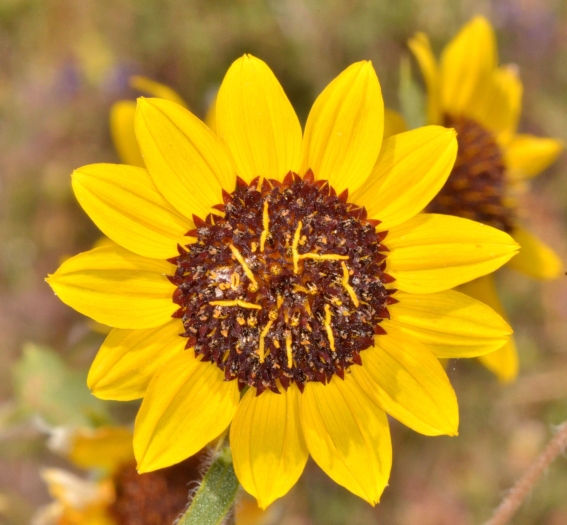Bolander’s Sunflower
(Helianthus bolanderi)
Bolander’s Sunflower (Helianthus bolanderi)
/
/

© dloarie
CC BY 4.0
Image By:
© dloarie
Recorded By:
Copyright:
CC BY 4.0
Copyright Notice:
Photo by: © dloarie | License Type: CC BY 4.0 | License URL: http://creativecommons.org/licenses/by/4.0/ | Uploader: dloarie | Publisher: iNaturalist |















Estimated Native Range
Summary
Helianthus bolanderi, commonly known as Bolander’s Sunflower, is a perennial herb native to the serpentine soils of chaparral, foothill woodlands, and open grasslands in California and southwestern Oregon. It typically grows over 40 inches tall with lance- or oval-shaped leaves and hairy stems. The plant is characterized by its bright yellow ray florets encircling a center of yellow to dark purple or reddish disc florets, blooming from late summer to early fall. The flowers are highly attractive to pollinators and are quite showy, making them a highlight in the late-season garden.
Bolander’s Sunflower is valued for its drought tolerance and ability to thrive in poor, rocky soils, making it an excellent choice for restoration projects and naturalistic plantings. It is also used in wildflower gardens and as a cut flower due to its striking appearance. In cultivation, it requires minimal maintenance, preferring full sun exposure and well-drained soils. While it is not commonly found in the horticultural trade, it can be grown from seed and is a valuable addition to pollinator-friendly gardens. Potential problems include susceptibility to powdery mildew in humid conditions and occasional damage from aphids.CC BY-SA 4.0
Bolander’s Sunflower is valued for its drought tolerance and ability to thrive in poor, rocky soils, making it an excellent choice for restoration projects and naturalistic plantings. It is also used in wildflower gardens and as a cut flower due to its striking appearance. In cultivation, it requires minimal maintenance, preferring full sun exposure and well-drained soils. While it is not commonly found in the horticultural trade, it can be grown from seed and is a valuable addition to pollinator-friendly gardens. Potential problems include susceptibility to powdery mildew in humid conditions and occasional damage from aphids.CC BY-SA 4.0
Plant Description
- Plant Type: Herb
- Height: 3-5 feet
- Width: 2-3 feet
- Growth Rate: Slow, Moderate
- Flower Color: Yellow
- Flowering Season: Spring, Summer, Fall
- Leaf Retention: Deciduous
Growth Requirements
- Sun: Full Sun
- Water: Low, Medium
- Drainage: Fast, Medium
Common Uses
Bee Garden, Bird Garden, Butterfly Garden, Drought Tolerant, Low Maintenance
Natural Habitat
Native to chaparral, foothill woodlands, and open grasslands in California and southwestern Oregon
Other Names
Common Names: Serpentine Sunflower
Scientific Names: , Helianthus bolanderi, Helianthus scaberrimus,
GBIF Accepted Name: